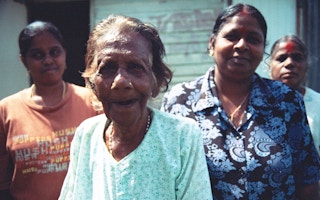A “living library” project in Malaysia’s capital is lending out older people’s knowledge to the young, to improve the lives of pensioners and bridge Kuala Lumpur’s generation gap.
It links groups of students with retirement homes so older people can discuss the challenges they face living in the city.
The project is run by the World Economic Forum’s Global Shapers Community, an international network of young professionals from business, academia and civil society, seeking to make a positive impact in local communities.
“We rotate the students around the elderly,” said Renard Siew, a “curator” with Global Shapers, which has more than 375 hubs around the world. “We allocate about one and a half hours for the Living Library session, and then we all eat together.”
“Some of the elderly folks were lonely and isolated because they felt their next-of-kin had dumped them at this old folks’ home,” the 32-year-old told the Thomson Reuters Foundation.
As well as sharing their life stories, the elderly participants also discuss safety issues in Kuala Lumpur, such as how long pedestrians get to cross roads and uneven pavements.
“
Some of the elderly folks were lonely and isolated because they felt their next-of-kin had dumped them at this old folks’ home.
Renard Siew, curator, Global Shapers
The young people draw on those chats at workshops where they chew over solutions to the problems troubling older people.
The International Monetary Fund (IMF) last year warned the rapidly growing number of elderly in Asia’s economies is set to create a demographic “tax” on growth.
Asia’s population growth rate is projected to fall to zero by 2050, and the proportion of working-age people—now at its peak—will decline over the coming decades, the IMF said.
The share of the population aged 65 and over will soar to nearly two-and-a-half times its current level by 2050, it said.
The average age of Malaysia’s population will be 60 years or more by 2030, said Siew, a sustainability advisor at Malaysian conglomerate Sime Darby Berhad.
“Malaysia is not prepared for this,” he said, adding that few nonprofit groups champion the issue. “Aging is still seen as quite a taboo subject in many Asian countries.”
The students have developed projects, including handicrafts and coding classes and an agency to help older people find part-time work, and are seeking funding partners.
Set up in 2016, the Living Library project organises up to three sessions with retirement homes each year, but would like to hold them monthly to meet demand.
The retirement homes involved declined requests to interview elderly participants.
Marcus Lim, 39, one of 23 “Global Shapers” in Kuala Lumpur, said the Living Library conversations start with pensioners’ life stories and move on to present-day challenges.
“Most of the young people feel inspired by the old people—what can they do to help them to live better?” said Lim, head of the business school at Swinburne University in Sarawak.
This story was published with permission from Thomson Reuters Foundation, the charitable arm of Thomson Reuters, that covers humanitarian news, women’s rights, trafficking, property rights, climate change and resilience. Visit http://news.trust.org.
The Thomson Reuters Foundation is reporting on resilience as part of its work on zilient.org, an online platform building a global network of people interested in resilience, in partnership with The Rockefeller Foundation.










